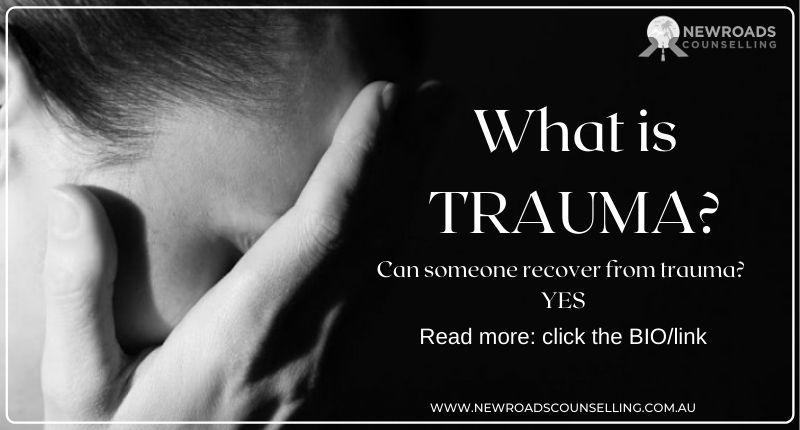Trauma is a very complex issue – it is a horrible, disturbing and distressing incident or treatment that causes long-term damage to the person experiencing the trauma. Therefore, dealing with your trauma has to be done carefully and needs an expert. During COVID-19, many experienced the trauma of losing their loved ones while not being able to do a normal burial, or hearing of someone you know losing their loved ones, or even from the news around the world. Since there are different types and levels of severity of the trauma, with everyone having a different capacity to deal with hurt and pain, we have to be careful not to generalise or minimise someone’s experience or compare experiences and reactions to trauma.
HOW TRAUMA HAPPENS
1. Trauma may occur in two ways:
- Direct experience – where the traumatised person suffers the trauma first-hand.
- Second-hand experience – such as hearing or witnessing the trauma that happens to others.
2. There are different causes of trauma:
- By nature – such as accidents, bushfire, landslide, flood, tsunami, earthquakes, etc.
- By an intentional goal to hurt others for personal gains – such as rape, childhood sexual abuse, adult sexual abuse, domestic violence, war, etc.
3. There are different types of trauma:
- Acute trauma – caused by a dangerous/threatening event either by nature or intentional goal.
- Chronic trauma – caused by multiple events over a long period of time, e.g. domestic violence, bullying, etc.
- Complex trauma – which often happens during childhood in prolonged and multiple traumatic events, e.g. childhood sexual abuse, neglect, violence, genocide, war, social unrest, etc.
HOW PEOPLE REACT TO TRAUMA
There are some common reactions when people face trauma:
1. Freeze – where the person cannot move because of the shock of the trauma
2. Flight – where the person runs when facing a traumatic incident or treatment
3. Fight – where the person fights back when trauma takes place
However, there are times when survivors have combined reactions of the above. For instance, someone might freeze first and then run from it, or freeze first and then fight the situation, or flight first and then come back to fight.
WHAT IS THE IMPACT OF TRAUMA?
Trauma is a very complex issue and can impact the traumatised person:
1. Physically
There are common physical symptoms of trauma, such as constant headaches, hyper-vigilance, hyper-arousal, somatic disturbance, pacing, palpitation, sweating, fatigue, dermatitis, irritable bowel, easily jumpy, heightened startle reactions, insomnia, nightmares, using substance abuse, etc.
2. Emotionally and psychologically
This can include having flashbacks, intrusive thoughts or images, dissociation, anxiety and depression, paranoia, shock symptoms, being suicidal, anger, numbness, irritability, fear, guilt and shame, confusion, etc.
3. Relationally
Trauma can impact relationships with others, including their marriage and parenting their children.
HOW PEOPLE COPE WITH TRAUMA
Many people survive trauma, however, it is very common that the victims of trauma do not attend to their trauma experience and its impact. Some people might not know what to do with their trauma, while for others, their trauma is denied by their own family and friends and as a result, they suppress it.
Thankfully, the awareness of dealing with trauma has increased. Hence, many come forward to speak up and seek help to deal with their trauma. Do not ignore your need to attend to your trauma, especially if you experience the above symptoms. As dealing with trauma is not easy, seeking help from a well trained and experienced Psychotherapist or Clinical Counsellor in trauma will help you work on your past and present issues, so that you can find some healing from \ and move on with your life in a healthy way.
CAN SOMEONE RECOVER FROM TRAUMA?
Yes, it is possible for someone to recover from trauma, providing they get:
1. The right treatment from an expert in this area
Psychotherapy/Counselling can help the traumatised person begin their recovery when:
- their story is finally acknowledged and believed
- safety is established
- the trauma story is reconstructed
- the survivor is empowered
- new connections between the survivor and their community are created
2. They have good support
Another important factor that plays a big role for someone to recover from trauma is when they have positive/good support from their loved ones, particularly from their spouse or partner if they have experienced sexual abuse in the past.
Having said that, it doesn’t mean you won’t experience some triggers in the future, but you will be able to manage it better and the trauma won’t give you any more pain.
Do you have any questions or further thoughts about trauma? Please use the comments section to share your thoughts and questions or contact us to discuss further. We are happy to provide 15 min free counselling if you have some concern.

